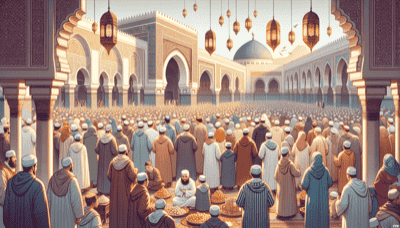We're here to help you keep count of the days to or since a date. Just click the button below and enter your chosen date to get started. Also choose the suggested days or search for a special day above #countingthedays

Date and Background:
In Morocco, the Prophet Muhammad's Birthday is known as Eid al-Mawlid an-Nabawi. It is celebrated on the 12th day of Rabi' al-awwal, the third month in the Islamic calendar. The occasion marks the birth of the Prophet Muhammad, Islam's final prophet according to Islamic belief. The history of this celebration dates back to centuries ago, with Sunni Islam traditionally recognizing it as a time for reflection and veneration of Muhammad's life and teachings.
Traditions: Moroccan customs for observing Eid al-Mawlid an-Nabawi include a variety of religious and cultural activities:
Spiritual Gatherings: Moroccans attend special prayer services at mosques, where they listen to sermons and recitations of the Holy Quran.
Recitation of Sira: Families or religious groups may gather to recite the Sira (the Arabic word for biography) of the Prophet Muhammad, reflecting on his life and moral conduct.
Food Distribution: It is common for people to prepare and distribute food among family, neighbors, and especially to those in need. Traditional Moroccan sweets like "Zalabia" (a kind of fried dough) and "Sellou" (a sweet made from toasted sesame seeds, fried almonds, and flour) are often made.
Decorations: Homes might be decorated with lights or green fabrics symbolizing Islam. Some areas may also have public celebrations with parades or storytelling about significant episodes from Muhammad’s life.
Charitable Acts: Charity plays an important role during this time as well; people are encouraged to give alms or volunteer their time to help others.
What People Do: On this day, Moroccans often take a break from work since it is considered a national holiday. They spend time with family members and participate in communal prayers or celebrations at local mosques. Many also use this opportunity to recite special prayers called Salawat (invocations) that praise the Prophet.
Children may receive new clothes or small gifts from their parents. It is also customary for families to visit gravesites of loved ones to pray for them—a practice reflecting devotion not only to their family but also drawing inspiration from the Prophet’s teachings about communal respect and remembrance.
Please note that observance can vary widely among individuals due to personal beliefs or interpretations within different communities across Morocco.